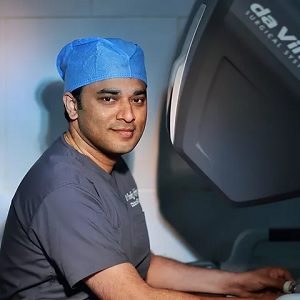Best Doctors in India for Rectal Prolapse Treatment
- Liver Transplant Surgeon and HPB Surgeon, Chennai, India
- Over 15 years’ experience
Profile Highlights:
- Dr. Selvakumar Naganathan is one of the best liver transplant surgeons in India with nearly 15 years of experience.
- He has carried out more than 2000 procedures, including 300 donor & 500 recipient hepatectomies, cadaver transplantations, retrieval of cadaver livers, and live donor liver transplants.
- He also established many liver transplantation centers across India & other countries.
- General Surgeon and Surgical Gastroenterologist, Chennai, India
- Over 27 years’ experience
Profile Highlights:
- Dr. Raghunath K J is a well-known name in the field of general surgery with an experience of more than 27 years.
- He went under training in advanced Laparoscopic surgery from Canada and France.
- Dr. Raghunath pioneers many prestigious projects in the UK.
- Dr. Raghunath has a specialized interest in Gall Bladder Stone treatment, Hernia, GI Cancer Surgery, Laparoscopic Sleeve Resection, Endoscopic Surgery, etc.
- Colorectal Surgeon and Robotic Surgeon, Chennai, India
- Over 26 years’ experience
Profile Highlights:
- Dr. Venkatesh Munikrishnan is one of the best Gastroenterologists and Colorectal Surgeons in Chennai, having 21 years of experience in managing disorders that need surgical treatment.
- Dr. Munikrishnan specializes in surgical oncology, endoscopy, Gastritis Treatment, etc.
- He is also active in research; one of his research on CT Colonography fetched a grant from Bracco, Milan, Italy.
- GI Surgeon and Liver Transplant Surgeon, Gurugram, India
- Over 20 years’ experience
Profile Highlights:
- Dr. Amit Nath Rastogi is a pioneer in the field of liver transplant surgery. He completed his fellowship in liver transplant surgery at Sir Gangaram hospital while being a part of the largest liver transplant program in the country.
- Furthermore, he received his training in robotic liver surgery from IRCAD -Strasbourg, France, and advanced robotic HPB training from Grosseto.
- Liver Transplant Surgeon, Gurugram, India
- Over 10 years’ experience
Profile Highlights:
- Dr. Prashant Vilas Bhangui is one of the highly trained liver transplant specialists who received his training in Surgical Gastroenterology and Liver Transplantation.
- He also holds a European Inter-University Diploma in Hepato-Biliary-Pancreatic Cancers.
- Dr. Prashant is further interested to work in certain fields which include hepatocellular carcinoma, colorectal liver metastases, and living donor liver transplantation. Besides this, he has also published several journals on these subjects.
- Gastroenterologist, Gurugram, India
- Over 7 years’ experience
Profile Highlights:
- Dr. Abhinandan Mishra is one of the young Gastroenterology doctors in Gurugram who is particularly interested in inflammatory bowel disease treatment.
- Dr. Abhinandan Mishra offers Endoscopic Retrograde Cholangiopancreatography, Ascites tap, Endoscopy, Peroral Endoscopic Myotomy, Capsule Endoscopy, Esophageal Manometry, Magnetic Resonance Cholangiopancreatography, etc.
- Gastroenterologist, Gurugram, India
- Over 18 years’ experience
Profile Highlights:
- Dr. Atul Sharma is a renowned Gastroenterology practitioner in Gurugram and is particularly interested in Third Space Endoscopy and Per Oral Endoscopic Myotomy (POEM).
- He presented several papers on Manometry, Luminal gastroenterology, and interventional Gastroenterology during training in Advanced Interventional GI Endoscopy.
- Gastroenterologist, Gurugram, India
- Over 15 years’ experience
Profile Highlights:
- Dr. Kapil Jamwal is a renowned GI practitioner in Gurugram with an extensive experience in digestive and liver disease.
- The specialist offers treatment for Hepatitis B, Jaundice, Hepatitis C, Inflammatory Bowel Syndrome, Acute Pancreatitis, Liver Diseases, and Irritable Bowel Syndrome.
- Gastroenterologist, Gurugram, India
- Over 18 years’ experience
Profile Highlights:
- Dr. Rajesh Padhan is a renowned Gastroenterologist in Gurugram with an extensive experience of more than 18 years in the field.
- He is skilled in carrying out various endoscopy procedures such as Colonoscopy, Endoscopic retrograde cholangiopancreatography, Endoscopic ultrasound, upper GI endoscopy, etc.
- Gastroenterologist, Hepatologist, Gurugram, India
- Over 25 years’ experience
Profile Highlights:
- Dr. Sakshi Karkra is one of the best Pediatric gastroenterologists in Gurugram.
- She has special interest/ expertise in Colonoscopy, Upper GI Endoscopy, Capsule endoscopy, Enteroscopy, Endoscopic variceal ligation, Foreign body removal, Stricture & achalasia dilatation, Polypectomy, Anal manometry, Liver Biopsy, and Colonic manometry.
Best Hospitals in India for Rectal Prolapse Treatment
Rectal Prolapse
Rectal Prolapse is a condition in which the rectum begins to push through the anus. The rectum is the last part of the large intestine, and the anus is the opening through which waste leaves the body.
This condition affects around 2.5 people out of 100,000. This condition is around six times more likely to occur in women who are over the age of fifty, as compared to men. The condition can range from mild to severe. Although mild cases can be treated without surgery, some of the severe cases require surgical intervention.
Although the rectum pushing and dropping down your anus might seem quite worrisome to many people, this condition is generally not a medical emergency. However, if you have this condition for too long, it might eventually get worse. The condition might also lead to embarrassment and affect a person’s quality of life.
While having a bowel movement, if you feel that something is not right, you should not ignore it. You should consider seeing a doctor as soon as you can, and receive a proper diagnosis.
Symptoms
The symptoms of this condition generally occur slowly. The first symptom is generally a feeling of a bulge in the anus. It might feel as though are sitting on a ball. With the help of a mirror, you might be able to see a reddish bulge peeking through or extending out of the anus.
During some bowel movements, a small part of the rectum will emerge, but it should retreat on its own or may be easily pushed back into its place.
Walking, sitting, exercise and any such normal physical activity also cause part of the rectum to push through the anus. If this condition worsens, there may be bleeding from the inner lining of the rectum. However, in cases of partial or complete prolapse, you might even have trouble controlling bowel movements.
Around half of the people with this condition also experience constipation.
Types
Rectal prolapse is of three types. The type is identified by the movement of the rectum:
- Internal prolapse- In this type, the rectum starts to drop, but it hasn’t pushed through the anus yet.
- Partial prolapse- In this type, only part of the rectum has moved through the anus.
- Complete prolapse- In this type, the entire rectum extends out through one’s anus.
Causes & risk factors
A variety of things can lead to this condition, and some of them include the following:
- Having a long-term history of diarrhea or constipation
- Having a long-term history of having to strain during a bowel movement
- Nerve damage that affects the ability of your muscles to tighten and loosen, which can result from pregnancy, vaginal childbirth complications, anal sphincter paralysis, or even an injury to your spine or back
- Old age, which might weaken muscles as well as ligaments in the rectal area
- Previous injury to the anal or hip area
- Neurological problems, which can include spinal cord disease or spinal cord transection
Generally, women develop rectal prolapse more than men, especially women older than the age of 50. In general, older people who have had a history of constipation or problems with their pelvic floor are known to have a higher chance of having the problem.
Some of the health conditions which can lead to rectal prolapse include the following:
- Chronic constipation
- Always having to strain for a bowel movement
- Congenital bowel disorders such as Hirschsprung’s disease or neuronal intestinal dysplasia
- Lower back injury or disc disease
- Chronic obstructive pulmonary disorder
- Benign prostatic hypertrophy
- Any injury or problems with ligaments keeping your rectum attached to the intestinal wall
- Muscle weakness in your anus or pelvic floor
- Having a close relative also having rectal prolapse
- Certain parasitic infections
Diagnosis
Your doctor is very likely going to perform a rectal exam at first. However, if you are hesitant about this, he/she might ask you to sit on a toilet and try to have a bowel movement. This should help your doctor to see the prolapse.
However, some more advanced tests might also be required, especially if you are having other related conditions. Some of them include the following:
Anal electromyography (EMG)
Anal manometry
In this test, a thin tube is inserted into your rectum to test the strength of the muscle.
Colonoscopy
Anal ultrasound
During an anal ultrasound, a probe inserted into your anus and rectum is used to examine the muscles as well as the tissues.
Proctosigmoidoscopy
This test also uses a long tube which is attached to a camera on the end. This tube is inserted deep into the intestines to check for inflammation, scarring, or tumors.
MRI
Pudendal nerve terminal motor latency test
Proctography
X-ray videos of your rectum during a bowel movement can also show how well it holds and releases the stool.










